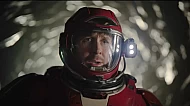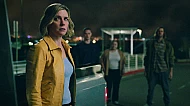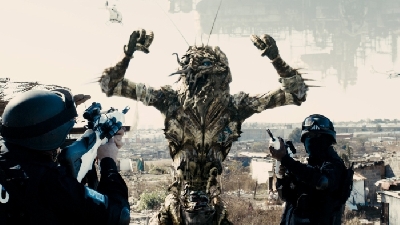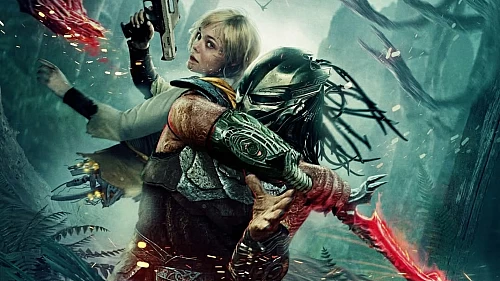A movie’s success is often defined by how well the marketing goes. Sure, posters and trailers are important but most of the films on this list have utilized the power of the internet and viral marketing in their favor. The more buzz a film gets then the more likely that people are going to want to see it. If you can bring the flavor of the film into as well that then you’re heading in the right direction. So, let’s take a look at some of the best marketing campaigns for Sci-Fi movies ever.
District 9
Director Neill Blomkamp’s 2009 film District 9 tells the story of an alien race segregated into a colony in South Africa. It was Blomkamp’s first feature film and with a relatively low budget, needed an excellent marketing campaign to get the word out there. To combat this, Sony released the “humans only” campaign to the wider public.

The campaign involved thousands of posters and “humans only” warning labels being sent to buildings, benches and places like public restrooms across the world. Each image had a toll-free number for people to call if they ever saw “non-human activity.” Sony claims that they received 33,000 calls from the public, topping off with a dedicated website called d-9.com (which has now been redirected to sonypicture.com)
Terminator 2: Judgement Day
The marketing for Terminator 2: Judgement Day has received more than its fair share of criticism. In the film, a carefully crafted story plays on audience assumptions in the early stages. The villain is revealed but we don’t actually know that Robert Patrick’s character is the T-1000, an upgraded version of Arnold Schwarzenegger’s T-800 from the first movie.
The trailer has been criticized for revealing this, effectively nullifying the careful planning leading up to the big reveal. The marketing effectively dropped a massive spoiler but in reality, it actually helped the film which grossed over $500 million at the box office. It certainly didn’t harm it long-term as Terminator 2 is still the subject of many people’s affections today. The T2 3-D: Battle Across Time attraction at Universal Studios is still operating in Florida and Japan and the film is the inspiration for the popular online slot game called Terminator II.
The Fly (1958)
The Fly is the story of a scientist who accidentally mutates into a human-fly after a sick experiment went wrong. Usually, films like this tend to carry a “don’t try this at home” warning label but this was the 1950s and things were different. In fact, 20th Century Fox offered to pay anyone $100 if they could prove that the scientific experiment in the film couldn’t happen.
Ex Machina
Alex Garland’s 2015 Ex-Machina was beloved by both fans and critics alike. It tells the story of Ava, an artificially intelligent humanoid played by Alicia Vikander. A programmer, Caleb is sent to test Ava and becomes infatuated with the machine.
The marketing campaign followed a similar tale. Tinder users in the Austin area were matched with a user called Ava during the SXSW Festival in the city. With a profile picture of Vikander and using lines from the show, the bot began to woo users across the city before redirecting them to the film’s Instagram page.

The Dark Knight
Not only is The Dark Knight one of the finest films released in the last few decades but it also had one of the best marketing campaigns. The interactive campaign involved over ten million people across the world taking part both online and in the real world. There were hidden clues on websites, online campaigns for the election of Harvey Dent and thousands of people across the world donned white face paint and became a part of The Joker’s crew. Why so serious?
Deadpool
2016’s Deadpool probably wouldn’t have even been made if it wasn’t for its marketing, even being mentioned by The Drum to have "Overshadowed the film". It was the 2014 leaked footage which caused enough of a stir on the internet to actually get the film its funding. However, the film’s marketing budget upon release was actually pretty small so star Ryan Reynolds worked closely with the studio to make the most Deadpool marketing they could muster. The result was wonderful with dozens of hilarious stunts popping up both online and in the real world, certainly helping the film to its record-breaking box office performance.

The Tingler
The Tingler is a 1959 film which tells the tale of a scientist who discovers a parasite which feeds on human fear. The marketing was actually more memorable than the film with Columbia Pictures and director William Castle working together to literally make The Tingler come to life. Towards the end of the film, The Tingler was shown entering a cinema screen before the central character said these words:
“Ladies and gentlemen, please do not panic. But scream! Scream for your lives! The Tingler is loose in this theatre!”
In theatres across America, buzzers were fitted to the underside of seats were then set off causing some panic amongst the moviegoers.
Inception
Christopher Nolan’s Inception was the subject of much secrecy during production. Information was drip-fed to the public with the film’s website simply being a clip of a spinning top. After months of this, the top eventually fell over which gave users access to a series of games and puzzles which, when completed, would show them the film’s trailer.
Cloverfield
2008 movie Cloverfield was one of the first films to utilise viral marketing and few have surpassed its strategies since. The plot of the film was shrouded in mystery with small hints given in the months before its release. The characters had MySpace pages and fake news reports were created which hinted at the movie’s monster existence across the world.
Red herrings were released across the world with fake titles and breadcrumb trails which delved deep into the far reaches of the internet. People were on tenterhooks when, eventually, the film’s memorable teaser poster was released, only adding to the buzz.

Final trailer for Project Hail Mary – the Ryan Gosling sci-fi movie has landed!
Ryan Gosling must work with an intelligent alien creature to devise a way to save Earth from destruction!

What’s Next For The Alien Franchise?
Explore what’s next for one of the world’s most successful franchises in Alien – movies, tv shows, games and more.

FROM Season 4 arrives April 19th, 2026!
The mind-bending sci-fi thriller returns for a fourth season this April on Prime Video!

Pluribus Creator Intended to Riff Off Genre Headliners, But Perhaps Didn’t Expect This Connection
From the creator of Breaking Bad and Better Call Saul, expectations were notably high for the Apple TV+ release of Pluribus. The platform’s risi...

Watch 2 new Mercy (2026) movie clips ahead of the film's January 23rd release date!
Amazon's MGM Studios have just released 2 new movie clips from Mercy starring Chris Pratt and Rebecca Ferguson.


